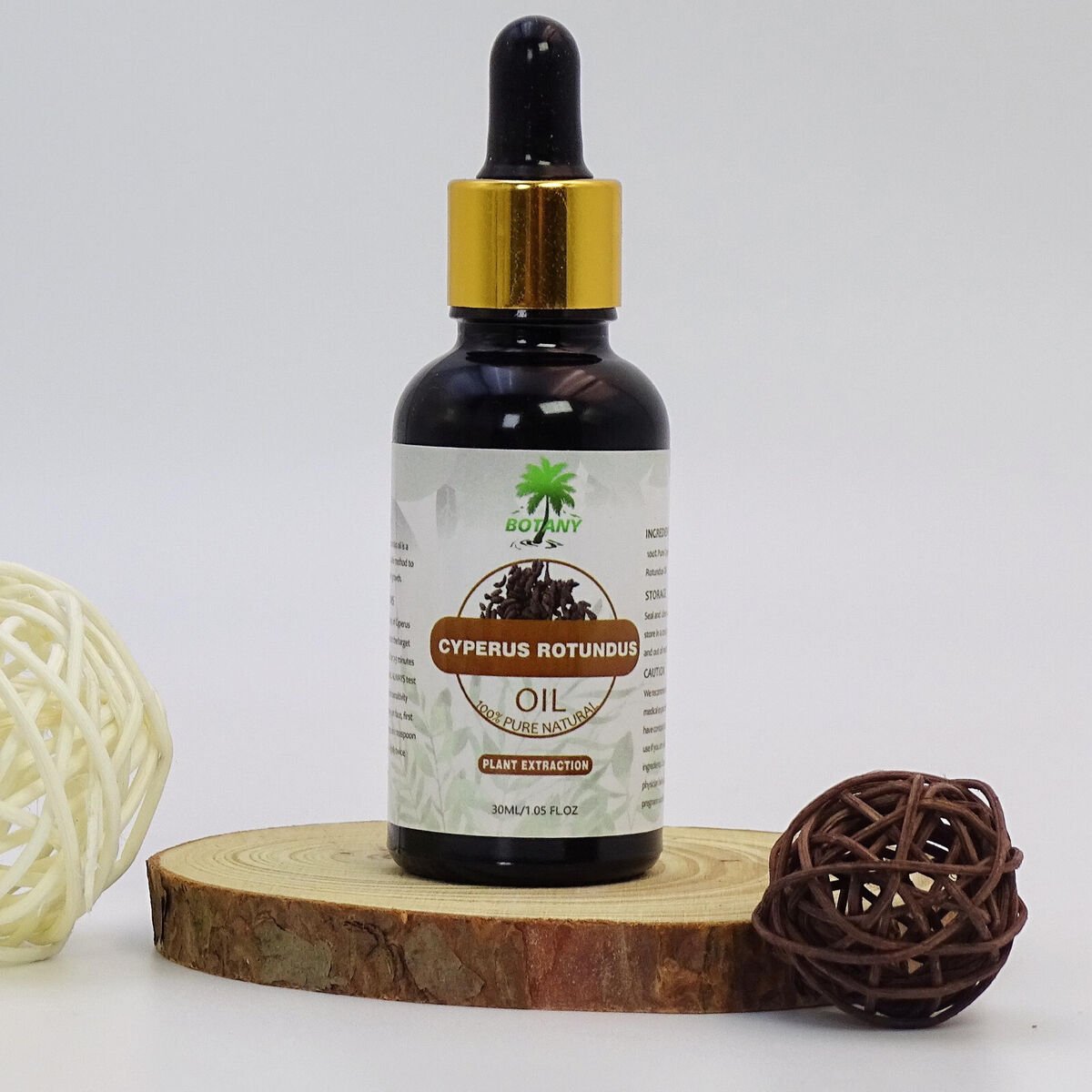
How to cite:
Wong M. Cyperus oil for hair removal: Is it safe and effective?. Lab Muffin Beauty Science. October 20, 2024. Accessed October 20, 2024.
https://labmuffin.com/cyperus-oil-for-hair-removal-is-it-safe-and-effective/
There’s been a lot of hype around Cyperus oil for hair removal, largely based on a study where it supposedly worked as well as laser. Unfortunately I don’t think it works, and if it did work, it would be a risky product to be using.

For context, my PhD is in medicinal chemistry. Part of this involves looking at the evidence on potential active ingredients, and deciding if they might be worth investigating further, mostly in terms of potential effectiveness and mechanism of action, but safety (longer explanation of medicinal chemistry here).
Related post: Does tranexamic acid work? Response to The Beauty Brains
Does cyperus oil work as well as laser?
There’s only one single study from 2014 on Cyperus rotundus oil versus laser, which isn’t great. Clinical studies are based on statistical significance, which essentially means there’s a low chance of the results being measured if there wasn’t a real effect.
There’s also a whole bunch of sus things about this particular study.
Table 3 shows 9 sets of the same numbers. This is probably a massive typo, but it’s a sign that the peer reviewers maybe didn’t look that closely at the rest of the paper either.


The same author also published another clinical trial on Cyperus rotundus oil and hair removal in 2012. Mo of Mo’s Skin Lab (he’s a toxicologist and an excellent person to follow!) spotted a set of before-and-after photos that are shown in both papers, albeit with the background photoshopped out in the newer paper:




This could be explained as a single subject who was included in the data sets for both studies, but in the 2014 paper it says the second photo was taken 8 months later, while in the 2012 paper it says 6 months – obviously only one of these can be correct. This 6 vs 8 month discrepancy is repeated in other parts of the methods (e.g. when they counted the hairs, when they did the questionnaires).
The results are also unrealistically neat. Hair fluctuates and people’s memories aren’t great, so you’d expect at least one person seeing decreased hair with the placebo, or one person who got increased hair with the cyperus oil or laser. But all ~115 people over the two studies had hair that behaved unnaturally well.
P-values are a way of measuring how well the results show a difference between placebo vs treatment. Over the two studies there were 28 p-values of 0.00, not counting the table with typos. This sort of almost-perfect difference just doesn’t happen with real life biological data, especially for hair studies… but it can certainly happen if someone is faking their data based on what they want to see happen.


This is a pattern with this author’s papers on cyperus oil – she’s the only person who seems to be running clinical trials on it (it’s also pretty suspicious how she’s the only person listed on most of her papers, which would’ve taken more than one person to realistically conduct). According to her studies, it’s also better than hydroquinone for hyperpigmentation, and better than steroids at reducing inflammation (with similar p-values).
So the results are probably BS, which means there’s no scientific evidence that it works. But it is traditionally used as a hair removal treatment, so it’s possible there’s an effect that just hasn’t been documented in a clinical trial.
That leads us to the next question…
Is cyperus oil safe?
Based on my understanding of cancer mechanisms, and discussions with Mo (regulatory toxicologist) and Dr Andrea Love (a biologist who works in cancer research), I would be very hesitant to use cyperus oil on myself.
The explanation for why it works is that it’s anti-androgenic, which means it’s acting on hormones like testosterone. This is concerning because if it’s having enough of an effect on hair follicles, there’s a really good chance it’s getting deeper as well – essential oils have components that can act as penetration enhancers.
This means cyperus oil would be a prime suspect as an endocrine disruptor. I haven’t seen any other explanation for how else it could be working, and as someone who’s seen the safeguards surrounding drug approval processes, I’m deeply uncomfortable with recommending a product with endocrine disruption potential and virtually no safety data.
Anti-androgens can potentially increase the risk of some cancers, like breast cancer – the relationship between anti-androgens and breast cancer is complex and not entirely understood.
As humans, we’re biased to think that products that are natural or have been used traditionally are safe. But there’s lots of cases where that hasn’t been true. For example, traditional kohl makeup often contains high levels of lead, and it’s been linked to higher lead concentrations in blood.
From a drug development perspective, many medications are based on natural substances with tweaks to improve their safety profile, and one of the most common reasons potential drugs don’t become approved as drugs is because of safety issues.
That’s the reason drug approval processes exist: things that are effective are often potent enough to act on other parts of the body, leading to side effects. A large part of drug approval is safety, which involves analysing the expected properties of the drug and testing it on cells and animals. Then it’s tested on people in different amounts with lots of careful monitoring, to work out the therapeutic window – whether there’s a dose where it’s effective, without too much potential for harm. Many substances don’t have a large enough therapeutic window to be safe, and some don’t even have a therapeutic window (i.e. it causes harm before it has a benefit). None of this data exists for cyperus oil.
As an example, spironolactone is a prescription medication that has anti-androgenic effects. This was flagged as a potential issue in pre-market safety data, which is why it carries a cancer warning, there’s instructions not to use it unnecessarily, and people taking it have been monitored for decades after it was placed on the market. This post-market surveillance data shows that it doesn’t seem to increase cancer risk when taken at normally prescribed doses.
But there’s been no official safety assessments for cyperus oil, and there’s no reason to think the risks would end up as insignificant as it did for spironolactone. Cyperus oil is also natural, so the amounts of the actives in it aren’t going to be consistent, plus there’s been reports of counterfeit products online.
I’m not usually someone who actively worries about ingredient safety – cyperus oil is one of the few things that has given me massive red flags (as have other hair reducing products in the past).
Hopefully it does absolutely nothing and is just a waste of money, but it really isn’t great when that’s the likely best case scenario for a product.
References
Williams AC, Barry BW. Essential oils as novel human skin penetration enhancers. International Journal of Pharmaceutics. 1989;57(2):R7-R9. doi:10.1016/0378-5173(89)90310-4
Elkaream G. Role of Cyperus rotundus oil in decreasing hair growth. J Intercult Ethnopharmacol. 2012;1(2):111. doi:10.5455/jice.20120626100304
Mohammed GFAEK. Topical Cyperus rotundus Oil: A New Therapeutic Modality With Comparable Efficacy to Alexandrite Laser Photo-Epilation. Aesthet Surg J. 2014;34(2):298-305. doi:10.1177/1090820X13518801
Mohammed GF. Topical Cyperus rotundus essential oil for treatment of axillary hyperpigmentation: a randomized, double‐blind, active‐ and placebo‐controlled study. Clin Experimental Derm. 2022;47(3):534-541. doi:10.1111/ced.14959
Mohammed GF. The effectiveness of Cyperus rotundus essential oil in reducing the side effects of laser hair removal. J of Cosmetic Dermatology. 2022;21(4):1501-1505. doi:10.1111/jocd.14301
Mohammed GF, Al‐Dhubaibi MS, Mohamed ML. Genital whitening with topical Cyperus rotundus oil enhances sexuality and quality of life. J Cosmet Dermatol. 2022;21(10):4490-4502. doi:10.1111/jocd.14918
Food and Drug Administration (FDA). Kohl, Kajal, Al-Kahal, Surma, Tiro, Tozali, or Kwalli: By Any Name, Beware of Lead Poisoning. FDA. August 22, 2024. https://www.fda.gov/cosmetics/cosmetic-products/kohl-kajal-al-kahal-surma-tiro-tozali-or-kwalli-any-name-beware-lead-poisoning





